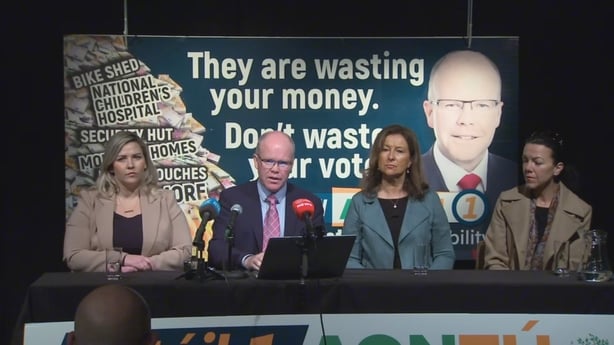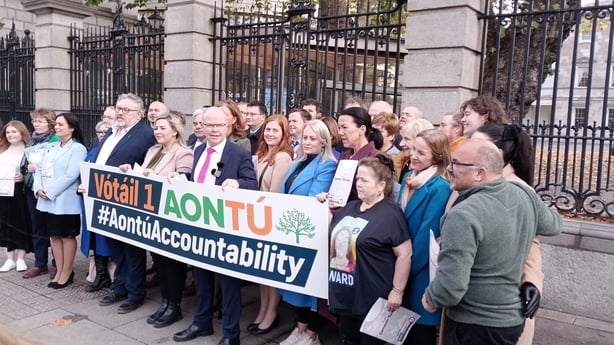For a party that promotes itself as the champion of efficiency, the fact Aontú's election manifesto was not available for the start of the press conference to launch the key document was not exactly ideal.
Nonetheless, when it eventually began, Peadar Tóibín was quick to outline the policies he believes makes his party stand out from rivals, and which he hopes means despite the short delay, next Friday's election is still coming right on time for Aontú.
Like other parties, Aontú has a number of policies focusing on the bread-and-butter issues of politics, including housing, the economy, cost of living, law and order and rural life.
But its manifesto also addresses issues where the party - and its leader Mr Tóibín, who in the now-dissolved Dail was Aontú's only TD - stands relatively alone, including abortion, immigration and gender identity issues.
So, from day-to-day policies to the ideological talking points, what does Aontú's manifesto say the party is prioritising to win over your vote?
Day-to-day issues
Chief among the daily issues highlighted in Aontú's manifesto is the economy, with the party's plans to encourage Irish citizens who have emigrated to return to help the country gaining significant attention.
The plan, called Operation Shamrock, includes a proposal to give returning workers such as health service workers and people in the construction sector a €5,000 grant to return to Ireland, while a €10,000 tax break is also available over four years.
Mr Tóibín told a press conference the policy will also involve an accelerated building of accommodation for people returning to Ireland, in a nod to the housing crisis facing the country.
On housing the party wants to re-introduce the no fault eviction ban, build 15,000 social and affordable homes a year and provide 8,000 vacant homes grants worth up to €70,000.
Mr Tóibín said having empty homes during a housing crisis is "akin to sending food away on ships in a famine".
Aontú says it wants to help farmers by introducing a fertiliser credit scheme and removing active farmland from the residential zoned land tax, while it also wants to re-open 26 rural garda stations and increase garda numbers to 18,000 - a move it says would benefit rural and urban communities.
Childcare and health services are also high on Aontú's agenda, with the party saying it wants to cap childcare costs at €100 per week to help families and to employ 400 more hospital consultants next year and 3,500 more nurses and midwives by the end of the decade, at a cost of €88m and €259m respectively.
And, speaking of money, the party also says it has plans for the economy and cost of living.
They include reducing the VAT rate for pubs and restaurants from 13.5% to 9%, at a cost of €545m per year, reversing the two most recent excise duty increases on petrol and diesel fuel, and introducing a "zero VAT rate" on electricity while prices remain high which Aontú says would cost €195m a year.
If all those figures might drive you to drink, Aontú also has some good news: it also wants to "help" Irish pubs by reducing the excise on alcohol sold in pubs and restaurants by 10 cent per unit.
Cheaper pints, in other words.

'Public sector waste'
In recent months Aontú has also been among several parties to highlight what has been described as financial waste in the public sector.
It highlighted the issue again at its manifesto launch by speaking in front of a graphic which read "bike shed, national children's hospital, modular homes, phone pouches, much more..."
And it is a point Aontú says it wants to address in the next Dail or potentially the next government.
Among the main points the party wants to see introduced are the creation of a junior minister role in the Department of the Taoiseach with direct responsibility for ensuring efficiency and ending "waste throughout the public sector".
Aontú also says civil servant job advertisements should be changed so that individuals can be held responsible for spending under their watch, including the possibility of losing their job, and for an end to the outsourcing of Office of Public Works contracts to third parties.
Ideological viewpoints
Given one of the reasons Mr Tóibín ultimately left Sinn Fein six years ago was because of a difference of opinion on the repeal of the eighth amendment, it is inevitable that abortion remains high on his party's list of priorities.
Aontú's manifesto includes a section on the right to life of the unborn, saying it wants to continue the three-day wait period for a woman who is seeking an abortion, and a "full freedom of conscience" rule on the issue for health service workers.
The party also says it wants to provide economic supports for all mothers who are pregnant, and that it opposes abortions which are based on gender or disability.
Its manifesto also separately says that a pregnant woman should have the option of an ultra-sound before deciding on whether to have an abortion.
Outside of the abortion issue, Aontú is also clear on its position on two further issues that have often divided opinion in Ireland: immigration and what the party calls "gender ideology".
On the second issue, the party says it is the "only" party in the Dail which agrees with the view that a woman is a female adult, or that a man cannot become pregnant or give birth.

The party says that, as such, it wants to "ensure" that information provided to pupils in Social Personal and Health Education (SPHE) classes adheres to "the ethos of the parents and schools" involved, and that teaching is "science and age appropriate".
It also wants to ensure that there are "female-only safe places" for women and girls, and says it is opposed to any "censorship laws" including hate speech legislation.
On the separate issue of immigration, Aontú makes it clear that it is against all forms of discrimination and uses in its manifesto the phrase "the colour of a man's skin is of no more significance than the colour of his eyes" - a phrase made world known in the Bob Marley anthem War.
However, Aontú does still outline a number of immigration - and specifically asylum seeker - changes it wants to see implemented, chief among them the creation of a new 4,000-staff-strong Irish border agency to oversee border control, applications and the enforcement of rules.
The party also wants an end to planning law exemptions for asylum accommodation, a six-month deadline for any asylum application decision and a ban on anyone with a criminal conviction seeking asylum in Ireland.
To help make the transition to Ireland smoother for people seeking asylum who meet these requirements, Aontú says it wants to introduce a "community dividend" worth millions to different parts of the country.
And it makes it clear that people destroying their passports on arrival in Ireland should not be allowed to remain.
'Common sense'
Aontú describes these policies as "common sense", a line it has attempted to hammer home by entitling its manifesto with the same message.
Speaking at the party's manifesto launch, Mr Tóibín first joked about the genuinely innocent delay in providing the document to journalists by saying "it's [the manifesto] so embargoed, they're only on their way".
He later told reporters that he believes "there is a wave of support" for his party which is running a candidate in every constituency, before heralding the recent success in this spring's no-no referendum result by saying "Aontú has come of age".
Only a week to go until the public decides whether Ireland is running on the same schedule as Peadar Tóibín's party.







